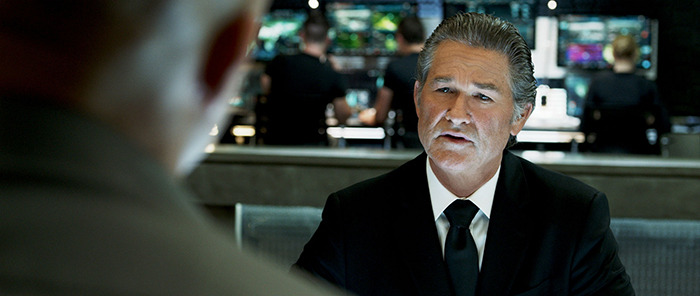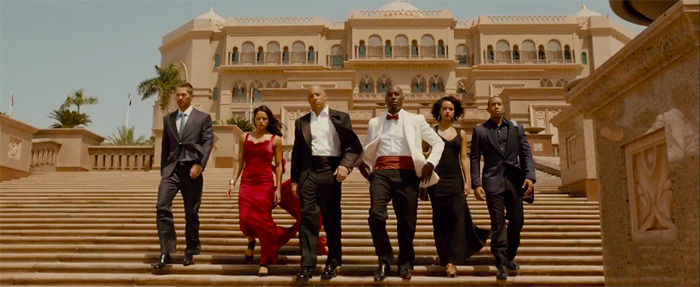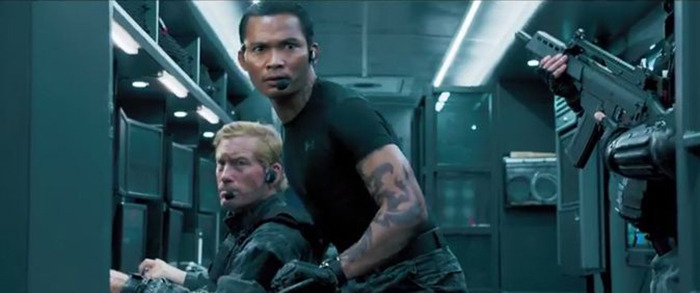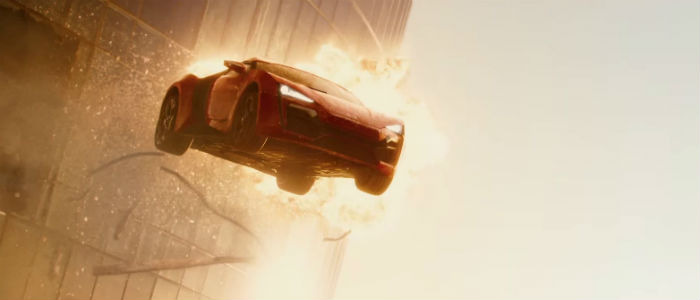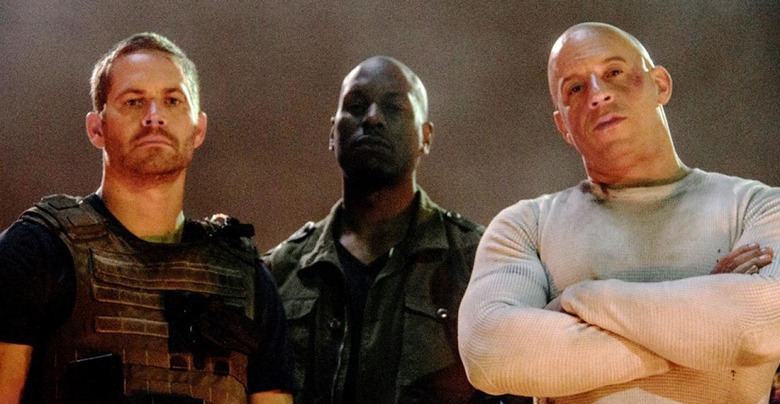'Furious 7' Is A Frantic Yet Respectful Goodbye To Paul Walker
Why are you even reading a Furious 7 review? For most of the franchise's enthusiastic audience there are only two questions to be answered about the latest sequel. One: does it do right by Paul Walker? Two: how does it continue the development of a film family while simultaneously expanding the scope of the increasingly insane action setpieces established by the previous two films?
Without spoiling specifics, the answer to the first question is that Furious 7 treats the late Paul Walker with more respect than it shows to anything other than cars and frantic punching. The answer to the second is more complicated. Furious 7 is more of a comic book movie than any other chapter in the series, with a few big setpieces and a lot of very repetitive action in between. It squeezes in one-liners, guest appearances and fluid camerawork wherever possible, but the returns are thin for anyone who isn't already invested in this series.
Brothers and Enemies
Picking up where Furious 6 left off, we open on a very pissed-off Jason Statham as he begins the grim process of taking revenge against those responsible for the death of his brother. (His brother being Luke Evans' character, the villain of the previous film.) Statham plays Deckard Shaw, a name that suggests, like the Deckard of Blade Runner, Statham is really playing an android. Or maybe he's a Batman villain. How else to explain the fact that he's basically super-smart, un-killable, and liable to show up at just the right time?
The plot also incorporates an all-seeing surveillance device called the God's Eye, essentially the 2.0 evolution of the surveillance system seen in The Dark Knight. It's really just an excuse to stitch together a few action sequences, and for a government agent played by Kurt Russell to spout expository paragraphs. The plot could be accurately explained using five or six emoji (a few frowny faces, a car, a computer and an explosion) but Russell is devastatingly charming and consistently more entertaining than everyone else on screen around him. More Kurt Russell please, all the time.
Lip service is paid to establishing a story that narrows down the "family" theme of the series to something about the bond between brothers, with this meant to feel like the culmination of the story that began in Fast Five. But the death of Paul Walker clearly threw the production into disarray, and the resulting story plays like a string of hastily rearranged writing prompts. At times it just leaps from one sequence to another with the lack of concern that defines Michael Bay's Transformers movies. Statham is never given a character beat other than "angry, really really angry." A mercenary figure played by Djimon Hounsou is given so little character that I first thought he was a callback to a previous film in the series that fans are meant to recognize. (He isn't.) The story revs up high, and then stalls out in second gear.
Focus on the Family?
Even the family theme of the previous films is given less room this time. Most of that theme is expressed by Vin Diesel using the word "family" in a sentence. Letty, played by Michelle Rodriguez, goes on something like a vision quest early in the film, and then simply returns, with a last-ditch scene late in the movie to explain what her inconsequential disappearance was about. Jordana Brewster spends most of the film exiled offscreen rather than with her family. We see Hobbs (Dwayne Johnson) with his daughter, but he is also sidelined most of the time. And the return of Lucas Black to the series — he was last seen in Tokyo Drift — is also basically inconsequential.
The ensemble feels much smaller, and the film suffers from the lack of Sung Kang and Gal Gadot. While the last few films have seen the Fast and Furious family expanding, this time there's a contraction, and not in the way you probably expect. The "family" feels smaller, and less vibrant. The Rock is great fun when he's around, but that's not often. A new character shows some potential, but she's primarily a passive participant, more a MacGuffin than a person.
The Guest Fighters
Furious 7 features guest appearances from two fighters: Ronda Rousey and Tony Jaa. We know Rousey from her conquests in MMA bouts, and Jaa from Thai action films such as Ong Bak. By this point the general template for a fight sequence in the series is well-established: you'll see a lot of very shaky camerawork, fast cuts, and CGI stitching between beats.
In other words, if you're looking for a showdown worthy of the great movie fight scenes, you won't find it here. Still, it's fun to see Rousey in her fight scene against [redacted to prevent spoilers, though you can probably guess] while Jaa's scenes are less satisfying. He's paired off with an opponent who isn't his physical equal, though seeing Jaa beat by any Hollywood action star seems like an elbow to the face. Jaa's last scene does feature some great moves and one bit of choreography that is among the film's better moments.
Overdriven Action
As set pieces go, the car drop sequence is tremendously entertaining and unquestionably the film's high point, which is probably why it has been so thoroughly used in trailers. Director James Wan, new to the series, brings a few of his own tricks to the table in mapping out and shooting action sequences, and Furious 7 has a distinct feel from the last few films. A highway heist also has a handful of excellent concepts, even though that basic structure is starting to feel pretty familiar. In fact, much of the structure of Furious 7 has the worn-down quality of an old tire. Wan and his crew battle that familiarity by throwing more stuff at the screen, and by the halfway point in a 140-minute film, the effect is wearying.
In Paul Walker's Memory
Furious 7 exists under the shadow of the death of Paul Walker, who was killed in a car accident prior to the completion of filming. Without Walker on hand to finish the movie, there's no way to make the film feel "whole." And so Furious 7 is split between two aims: creating a crowd-pleasing action film, and honoring one of the series' core actors. In a face-off between those two aims, Walker almost always wins. And that's really as it should be. This is a series that has expanded into unlikely serial/soap-opera proportions, where the actors can seem all but interchangeable with their characters. Handling Brian O'Conner's last ride is the most important task the film has, and the filmmakers are up to it.
Walker's re-introduction here is among the film's best (and simplest) comedy gags, and sequences often seem to have been reworked to highlight his character Brian wherever possible. It seems like there's a reference to death or funerals in every third scene featuring Walker, which keeps the mood somber, even if it is an unavoidable aspect of the script that was written prior to his fatal accident. I watched the entire film with bated breath waiting to see how it would handle Walker's death, and Brian's presumed exit.
This series goes for a lot of cheap shots, but when it comes to Walker the tone is respectful. His fate, and that of his character, is handled in a way that is sensitive and even moving. Those scenes are the sort of stuff that has made this franchise a powerful force in mainstream film, and while I'm happy to see that Paul Walker's final onscreen appearance is crafted with some grace, I also wish that touch was more evident throughout the film. Still, the culmination of his story is, given the circumstances, just right, and that conclusion is likely enough to have fans forgiving the film for some of its other shortcomings.

